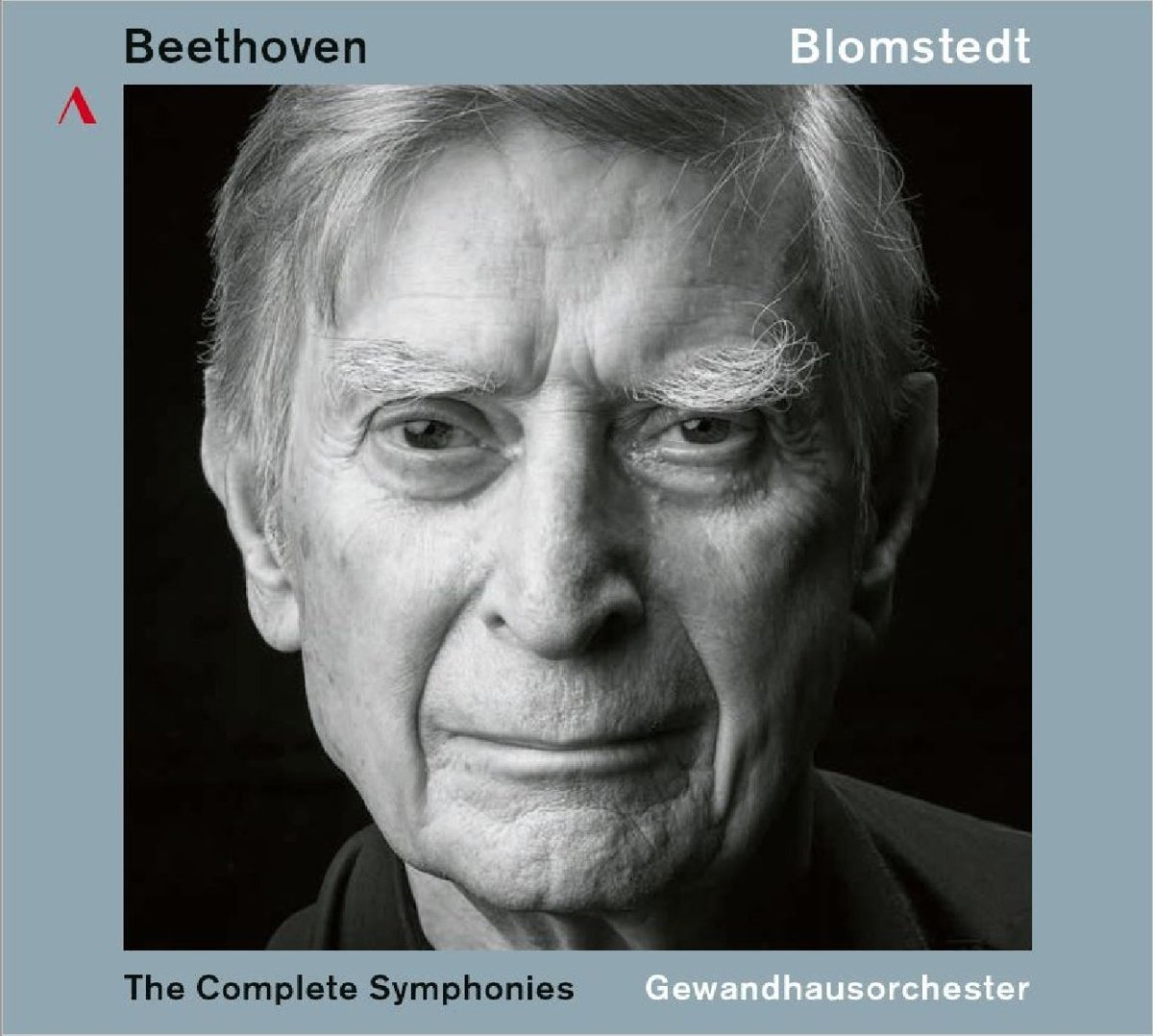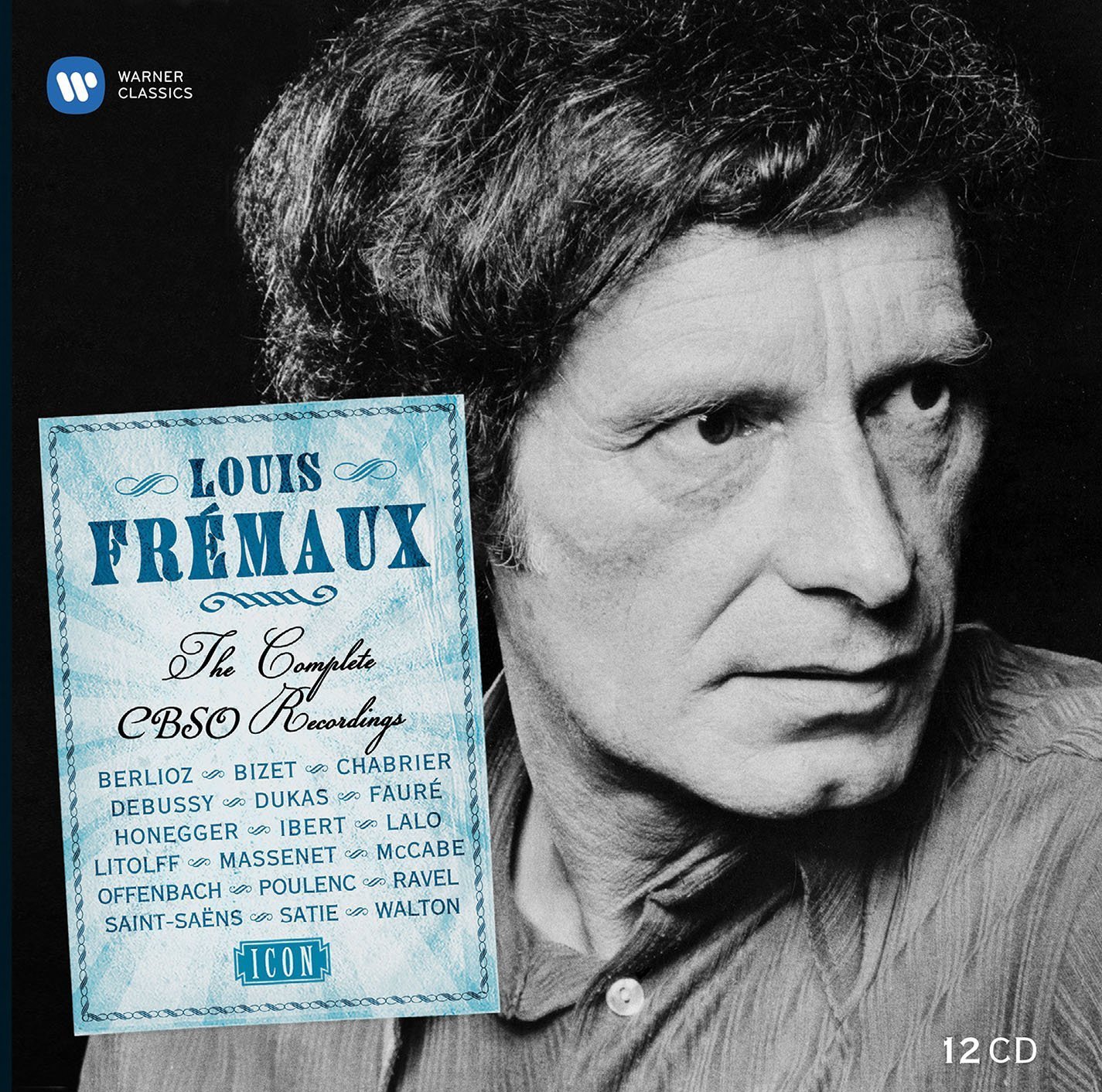Classical CDs Weekly: Beethoven, Louis Frémaux, Les Passions de l’Ame | reviews, news & interviews
Classical CDs Weekly: Beethoven, Louis Frémaux, Les Passions de l’Ame
Classical CDs Weekly: Beethoven, Louis Frémaux, Les Passions de l’Ame
Scintillating German symphonies, analogue treats from Birmingham, and a disc of baroque humour

 Beethoven: Symphonies 1-9 Gewandhausorchester Leipzig/Herbert Blomstedt (Accentus)
Beethoven: Symphonies 1-9 Gewandhausorchester Leipzig/Herbert Blomstedt (Accentus)
There's already an excellent set of Beethoven symphonies conducted by Herbert Blomstedt with the Staatskapelle Dresden, recorded in the late 1970s. It's now on a budget label and can be picked up for a pittance. This new one, taped live between 2014 and 2017, is a tad pricier, but well worth the extra outlay. The playing of the Gewandhausorchester is indecently good: how refreshing to hear a full-size orchestra playing these pieces, the weight of sound thrilling in places. Blomstedt doesn't do anything radical; there's no straining for effect or tinkering with tempi or dynamics. He just plays what's written, brilliantly so. Timings are, on the whole, slightly swifter than on the Dresden set, Blomstedt broadly adhering to Beethoven’s metronome markings. First and second violins face each other, allowing us to hear Beethoven's antiphonal exchanges. And, though you'd forgive the odd flub in performances conducted by someone who's nearly 90 years old, these immaculately polished readings bubble with electrifying energy. Sample this Eroica’s thrilling opening, or the lead into the main section of No. 4’s first movement, leaving shock waves in its wake.
No. 5 has grandeur in spades, the lead into the finale winningly done. More revelatory is Blomstedt’s Pastoral, a work which can send me to sleep in the wrong hands. Not here: those extraordinary minimalist rustlings in the first movement’s development are genuinely startling. The storm sequence is terrifying. The disc in the set I've returned to most contains Nos. 7 and 8, both rhythmically buoyant. And Blomstedt's Brucknerian credentials lend No. 9’s opening a craggy grandeur, in an unindulgent reading crowned by superb choral singing and a decent quartet of soloists. Exceptionally good, and certainly the equal of Chailly’s fine Decca set with the same orchestra. Accentus Music’s sound has a bit more depth and body, though. Classy packaging too, Blomstedt’s twinkly visage gazing out benignly from the sleeve.
 Louis Frémaux: The Complete CBSO Recordings (Warner Classics)
Louis Frémaux: The Complete CBSO Recordings (Warner Classics)
Louis Frémaux became Principal Conductor of the City of Birmingham Symphony Orchestra in 1969. He transformed the ensemble’s reputation, a charismatic French conductor hired by management seeking “a man who would build up the orchestra”. Which he soon began to do, securing an EMI record contract and quickly attracting new audiences. Frémaux recorded 16 LPs during his tenure. If you grew up during the 1970s, you probably heard quite a few of them: discs of Fauré’s Requiem and Saint-Saëns’ Symphony No. 3 were big sellers in the day and still sound good: the famous organ entry in the latter’s last movement is overwhelming. Frémaux also prompted the creation of the CBSO Chorus, who acquit themselves brilliantly in a pioneering recording of Berlioz’s vast Grande Messe des morts. There's a lot of French music in this set: earthy readings of Poulenc’s Gloria and Les biches alongside a host of rarities. Like a wonderful suite from Massenet’s ballet Le Cid, and Bizet’s seldom-heard suite Roma. Honegger’s rowdy Pacific 231 is another sonic spectacular (many of Frémaux’s discs were recorded in quadrophonic sound) and there's an enticing Jacques Ibert anthology. His Divertissement gets an occasional airing, but works like the Louisville Concerto and Bostonia are real finds.
Frémaux had planned to tape Britten's War Requiem, a project realised with another conductor in the early 1980s. He did leave polished performances of Walton’s Gloria and Te Deum – neither work a patch on Belshazzar’s Feast, but good to hear, alongside fizzing readings of the two coronation marches. Walton’s Bach-inspired ballet The Wise Virgins is fun, and there’s an electrifying disc of music by the underrated pianist-composer John McCabe. Plus an enjoyable collection of popular arias sung by tenor David Hughes. And more besides: bits of Ravel, Debussy, Dukas and Lalo. The remasterings are consistently impressive, and we get succinct notes from theartsdesk’s Richard Bratby. Frémaux left the orchestra abruptly in 1978. His young successor described the CBSO then as “the best French orchestra in the world”. Simon Rattle continued to raise the orchestra’s profile, but without Frémaux’s labours the task would have been much more arduous. An excellent set – 12 generously filled discs in an attractive slimline box. Essential.
 Schabernack: A treasure trove of musical jokes Les Passions de l’Ame/Meret Lüthi (Deutsche Harmonia Mundi)
Schabernack: A treasure trove of musical jokes Les Passions de l’Ame/Meret Lüthi (Deutsche Harmonia Mundi)
The best musical jokes creep up on you by stealth. Think of the farting bassoons in Haydn’s Symphony No. 93, or the chord which closes Ives's Symphony No 2. This disc of baroque music from Meret Lüthi’s Swiss group Les Passions de l’Ame should invoke both wry smiles and belly laughs. Fux’s Les Combattans is a tiny suite for two sparring violins and continuo, the fireworks interrupted by a peculiar, repetitive “Perpetuum mobile” movement, here underscored by gently rattling percussion. Schmelzer’s Sonata Cu Cu is full of major and minor thirds representing cuckoo calls. The best effects are again provided by percussionist Peter Kuhnsch, whose creative embellishments are subtle but impeccably tasteful.
Much of this music is so delightful that the jokes are merely an added bonus: the little “Balletto 2” from Schmelzer’s Arie con la Mattacina is the catchiest thing I've heard in months. A highlight is Biber’s Battalia a 10. At one stage the violone (an early double bass) plays with a sheet of paper beneath its strings, the resultant rattling sounding like ominous drumbeats. The very best is saved until last: the brief “Pour le Coucou”’ from an overture by Fux. Where the cuckoo’s call is entrusted to a nose flute. One of these instruments entered my life unexpectedly a month or so ago. It's had a transformative effect – imagine an ocarina crossed with a Theremin. Buy this irresistible disc, then purchase a nose flute.
Explore topics
Share this article
The future of Arts Journalism
You can stop theartsdesk.com closing!
We urgently need financing to survive. Our fundraising drive has thus far raised £49,000 but we need to reach £100,000 or we will be forced to close. Please contribute here: https://gofund.me/c3f6033d
And if you can forward this information to anyone who might assist, we’d be grateful.

Subscribe to theartsdesk.com
Thank you for continuing to read our work on theartsdesk.com. For unlimited access to every article in its entirety, including our archive of more than 15,000 pieces, we're asking for £5 per month or £40 per year. We feel it's a very good deal, and hope you do too.
To take a subscription now simply click here.
And if you're looking for that extra gift for a friend or family member, why not treat them to a theartsdesk.com gift subscription?
more Classical music
 Robin Holloway: Music's Odyssey review - lessons in composition
Broad and idiosyncratic survey of classical music is insightful but slightly indigestible
Robin Holloway: Music's Odyssey review - lessons in composition
Broad and idiosyncratic survey of classical music is insightful but slightly indigestible
 Classical CDs: Wolf-pelts, clowns and social realism
British ballet scores, 19th century cello works and contemporary piano etudes
Classical CDs: Wolf-pelts, clowns and social realism
British ballet scores, 19th century cello works and contemporary piano etudes
 Bizet in 150th anniversary year: rich and rare French offerings from Palazzetto Bru Zane
Specialists in French romantic music unveil a treasure trove both live and on disc
Bizet in 150th anniversary year: rich and rare French offerings from Palazzetto Bru Zane
Specialists in French romantic music unveil a treasure trove both live and on disc
 Scottish Chamber Orchestra, Ibragimova, Queen’s Hall, Edinburgh review - rarities, novelties and drumrolls
A pity the SCO didn't pick a better showcase for a shining guest artist
Scottish Chamber Orchestra, Ibragimova, Queen’s Hall, Edinburgh review - rarities, novelties and drumrolls
A pity the SCO didn't pick a better showcase for a shining guest artist
 Kilsby, Parkes, Sinfonia of London, Wilson, Barbican review - string things zing and sing in expert hands
British masterpieces for strings plus other-worldly tenor and horn - and a muscular rarity
Kilsby, Parkes, Sinfonia of London, Wilson, Barbican review - string things zing and sing in expert hands
British masterpieces for strings plus other-worldly tenor and horn - and a muscular rarity
 From Historical to Hip-Hop, Classically Black Music Festival, Kings Place review - a cluster of impressive stars for the future
From quasi-Mozartian elegance to the gritty humour of a kitchen inspection
From Historical to Hip-Hop, Classically Black Music Festival, Kings Place review - a cluster of impressive stars for the future
From quasi-Mozartian elegance to the gritty humour of a kitchen inspection
 Shibe, LSO, Adès, Barbican review - gaudy and glorious new music alongside serene Sibelius
Adès’s passion makes persuasive case for the music he loves, both new and old
Shibe, LSO, Adès, Barbican review - gaudy and glorious new music alongside serene Sibelius
Adès’s passion makes persuasive case for the music he loves, both new and old
 Anja Mittermüller, Richard Fu, Wigmore Hall review - a glorious hall debut
The Austrian mezzo shines - at the age of 22
Anja Mittermüller, Richard Fu, Wigmore Hall review - a glorious hall debut
The Austrian mezzo shines - at the age of 22
 First Person: clarinettist Oliver Pashley on the new horizons of The Hermes Experiment's latest album
Compositions by members of this unusual quartet feature for the first time
First Person: clarinettist Oliver Pashley on the new horizons of The Hermes Experiment's latest album
Compositions by members of this unusual quartet feature for the first time
 Gesualdo Passione, Les Arts Florissants, Amala Dior Company, Barbican review - inspired collaboration excavates the music's humanity
At times it was like watching an anarchic religious procession
Gesualdo Passione, Les Arts Florissants, Amala Dior Company, Barbican review - inspired collaboration excavates the music's humanity
At times it was like watching an anarchic religious procession
 Classical CDs: Camels, concrete and cabaret
An influential American composer's 90th birthday box, plus British piano concertos and a father-and-son duo
Classical CDs: Camels, concrete and cabaret
An influential American composer's 90th birthday box, plus British piano concertos and a father-and-son duo
 Cockerham, Manchester Camerata, Sheen, Martin Harris Centre, Manchester review - re-enacting the dawn of modernism
Two UK premieres added to three miniatures from a seminal event of January 1914
Cockerham, Manchester Camerata, Sheen, Martin Harris Centre, Manchester review - re-enacting the dawn of modernism
Two UK premieres added to three miniatures from a seminal event of January 1914

Add comment